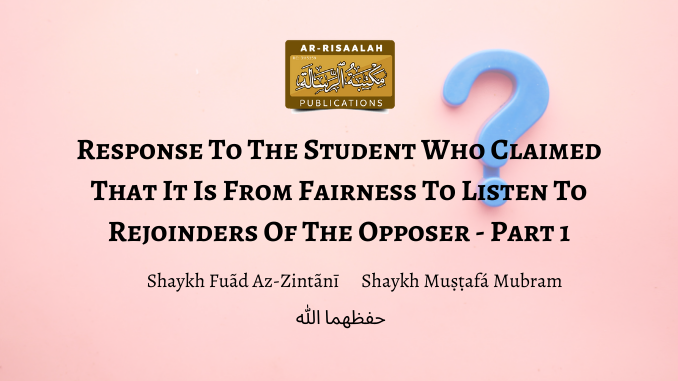Shaykh Fuãd Az-Zintãnī:
Wa Alaykum salãm wa rahmatullãh wa barakãtuhu.
Know—may Allãh bless you—that whoever was upon the Sunnah and the scholars spoke against him with evidence and proofs, then he is to be warned against. If they declared him an innovator, he is to be declared an innovator.
As for what you mentioned regarding this brother, that he listens to the defence of the one that has been warned against for himself or the defence of his students for him, this [action of his] is from confusion, mixing things up, and not having trust in the scholars. Because the one that was spoken against might defend himself with falsehood— and we have seen this. And his students might defend him with falsehood—and we have seen this. As it occurred from the followers of Abū-l-Hasan [Al-Ma’ribī], the followers of Al-Halabī, and the followers of Al-Hajūrī.
All these (people) tried to defend their leaders, and to support them with falsehood and not with proof and evidence.
So I fear that this (person) will fall into the deception of those (people).
So upon him is to trust the scholars and to read from them. And if the scholars see a refutation from that person that has been spoken against, and it deserves to be spoken about, they will speak. Otherwise, they would not pay any attention to it.
He might deceive the people with refutations and the scholars will be obliged to refute him.
So upon him is to stick to the major scholars and leave this affair.
Rather—in reality—it seems there is something of feigning knowledge in him. Meaning, the statement of the scholars that is established upon proof and evidence does not appeal to him, (rather), he must read for himself, and read the refutations of the adversary.
Then afterwards, he himself will judge and he will become a judge over the speech of the scholars. This is not correct, this path is not upright. And Allãh knows best.
Shaykh Muṣṭafá Mubram:
In the name of Allāh, the Most Merciful, the Especially Merciful. All praises are due to Allāh, the Lord of the worlds. And may Allāh extol, grant peace, and bless His slave and messenger, Muḥammad, his household, and his companions, and may He grant them lots of peace, till the Day of Recompense.
The questioner, may Allāh pardon us and him, says—in a question sent from Nigeria:
“If we used to know a man upon the Sunnah, then the major scholars declared him to be an innovator afterwards, and then one of the brothers notified us that the man has clarified what the scholars held him for, is it from fairness that the student of knowledge listens to his defence for himself and reads what his students have written in defence for him?
“May Allāh reward you with goodness.”
I say: I ask Allāh for guidance and appropriateness in speech and action.
We did not see the major esteemed scholars who are firmly established in knowledge, sincere advisors of the Ummah, those who are referred back to in the Nawāzil (newly-occurring affairs of public interest) and the grave affairs—over the course of the generations of this Ummah.
Ever since the science of al-Jarḥ wa at-Taʿdīl (disparagement and praise) became existent and ever since sincerity of purpose to Allāh, the Blessed and Most High, became existent in this Ummah, they [i.e., the scholars] did not spoke against anyone who opposes or exits the fold of the Sunnah, except from the angle of knowledge, verification, justice, and fairness.
And this is their method—and all praise is due to Allāh—regarding what they clarify to the Ummah from the conditions of the deviants.
So, when they speak against an individual, then their speech is treated in accordance to what I have mentioned earlier, that it is based on knowledge, proof, sincere advising, and admonition.
Then, what is compulsory for the Muslims altogether, and at the forefront of them, the students of knowledge, and the nascents and beginners, is to take the speech of their scholars, according to the textual evidence of the Book, Sunnah, and scholarly consensus, because their speech is a proof for what they clarified of proofs.
Our Lord, the Exalted and Most High, had said [what means]:
﴾When there comes to them some matter touching (public) safety or fear, they make it known (among the people), if only they had referred it to the Messenger or to those charged with authority among them, the proper investigators would have understood it from them (directly). Had it not been for the Grace and Mercy of Allah upon you, you would have followed Shaitan (Satan), save a few of you.﴿ [An-Nisāʾ: 83]
And our Lord, the Majestic and Most High, said in His noble book [what means]:
﴾O you who believe! If a rebellious evil person comes to you with a news, verify it.﴿ [Al-Ḥujurāt: 6]
And in the other mode of recitation, ﴾fa tathabbatū﴿.
And the Mafhūm al-Mukhālafah (divergent meaning) which was used as proof by all the scholars is that when a just, upright individual brings the news, it must be accepted.
And the people of knowledge, who are firmly established in it, are the people of justice and uprightness.
And most especially and with more emphasis on this aspect—the aspect of warning against the people of innovations and desires.
So, if what the questioner posed in his question is accepted [for the sake of argument], that an individual was spoken against, or that the scholars, or a firmly established scholar who is knowledgeable of the angles of warning against and al-Jarḥ wa at-Taʿdīl, and who can take the responsibility, spoke against an individual who used to apparently be upon the Sunnah, and then he [i.e., the individual that was spoken against] took these observations and made a rejoinder on them, or he was defended by his students—as the questioner referred to them—those who, in most cases, are the ones encouraging him and bigoted to him, then the people of knowledge are the ones whom it is compulsory for him to present his rejoinder on these observations to.
And we say this from the angle of assumption for the sake of argument. Otherwise, most of these individuals do not give any consideration to or care about the scholars. Their main goal is revolting against the scholars. And this has been experienced for decades.
And if they were truthful—them and those named their students—they would clarify this to the people of knowledge that criticized them and clarified their condition.
Then we give a second answer. Indeed, this student of knowledge that named his action fairness, how did he reach the level of judging the speech of this individual as being wrong or right, or that he has done a rejoinder on the criticisms and observations that we has charged for.
So, he says regarding what he thinks he made a refutation with, clarified, or explained, that he has uplifted the issue or liability from himself.
And it is known that picking thorns with barehands is nothing compared to this—as it is said.
A third response: if this individual was truthful in what he says, he would publicize his repentance and recantation, and that he had erred in what he was criticized for.
Because the people of knowledge do not refute ambiguous issues or those in which differing is allowed or those which the scholars differed regarding and is included within their ijtihād.
They do not refute the Sunnī the way they refute the people innovations. In most cases, they only clarify the knowledge-based issues that this individual or scholar made ijtihād regarding with proofs and that he opposed the proof.
And this is many in the writings and books of the people of knowledge.
However, we are speaking of a man who used to feign being upon or was upon the Sunnah, but he committed religious innovations and he mounted the wave of desires. So, the people of knowledge refuted him.
So, if this is the case, and the reason for this issue is ascertained, then the issue does not call for his rejoinder.
What is compulsory for him is to only recant from it.
For example, like the one who invited Ahl as-Sunnah to splitting, and told his followers and students, “Do not unite with them. And do not accept them.”
And this is from the worst form of splitting, innovation, and invitation of the people to opposing the Book and the Sunnah, and not returning to the Book, the Sunnah, what the people of knowledge agreed upon, and what the Muslims established in every time and place.
Rather, Shaykh Al-Islām, may Allāh have mercy upon him, says: “Indeed, from the Sunnah is abandoning the [non-binding] Sunnah for uniting the hearts.”
And this individual calls the people to innovation, desires, splitting, and not uniting.
Then, the heedless among his followers says: “He only said this with conditions. He does not dictate to us, because our Shaykh is more knowledgeable than him and older than him.”
Yā subḥānallāh! Where are the fundamental principles of Salafiyyah that the beginner student studies?!
And that from the greatest of them is unity upon the statement of Tawḥīd and the Sunnah.
And this aspect is a long one. And what is intended is to censure what the questioner asked about that these students claim that they want to check the speech of this opposer and his rejoinders on what the people of knowledge criticized him for.
And that individual who has been put to trial—Abū al-Fitan (the father of tribulations; Abu Al-Ḥasan Al-Maʾribī)—when the scholars criticized the deviants from the contemporaries, such as the Jahmiyyah, Ḥulūliyyah, Ittiḥādiyyah, and the Takfīrīs, he said: “I will not accept it until I check the disparagement myself,” while he is a miserable individual.
As other than him is described, Abū [….].
He endorsed himself with one or two treatises, or one or two treatises, or a book he published, or a lesson he organized, so he wanted to contend with the scholars and the Imāms of Islām regarding what they carry out of sincere advice to the Ummah.
So, he argued until he argued in the favour of the one who holds the Qurʾān being a created being, and so forth.
The arena bears witness, and history bears witness, and our contemporary history is vocal regarding the fact that the people of knowledge did not speak against anyone except with proof, and most of them are not known to return, clarify, and submit to the truth.
We ask Allāh to guide the misguided among the Muslims, and to pardon us and you.
I repeat the advice to this student and these students, that they should stick to the major scholars, for indeed, this is the way of the past righteous predecessors, and it is a means to the protection of the Muslim from the devils—as we have previously mentioned in the verse of Sūrah An-Nisāʾ:
﴾Had it not been for the Grace and Mercy of Allah upon you, you would have followed Shaitan (Satan), save a few of you.﴿ [An-Nisāʾ: 83]
May Allāh guide all to what He loves and is pleased with.






